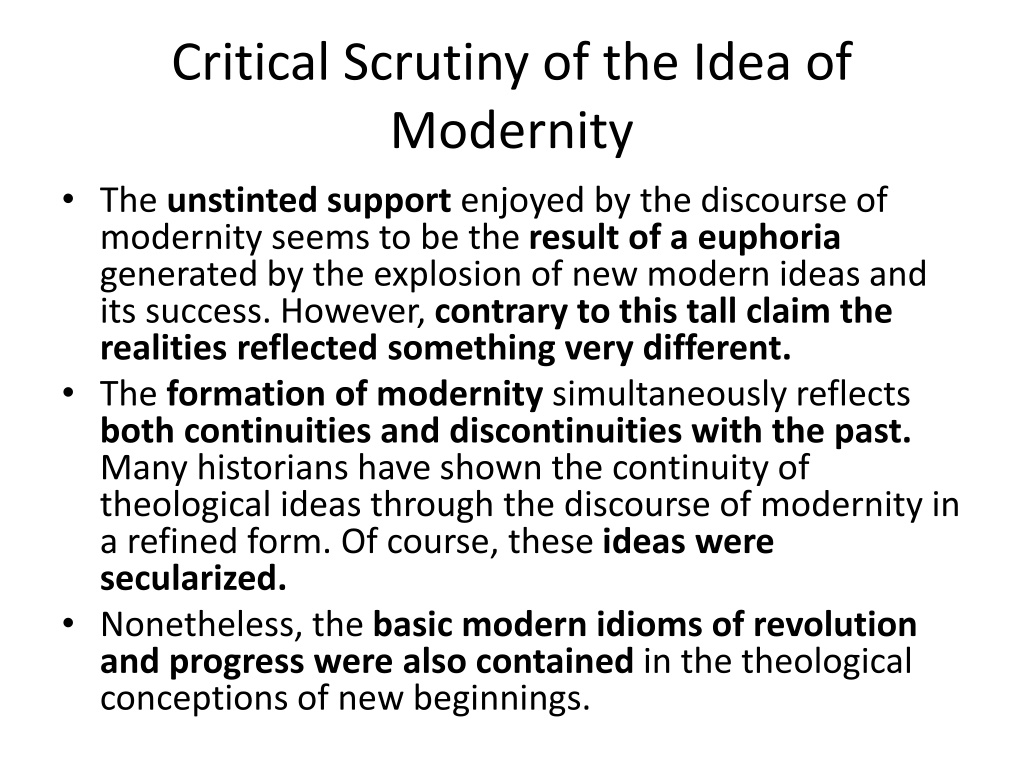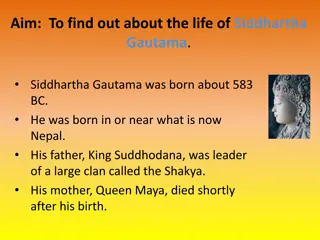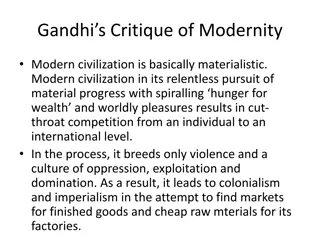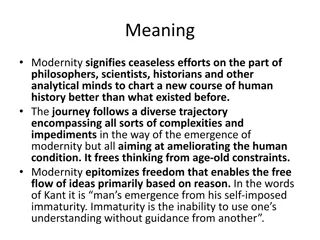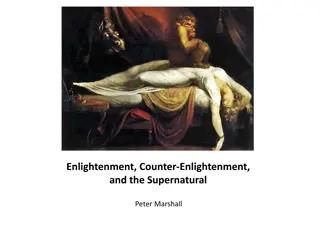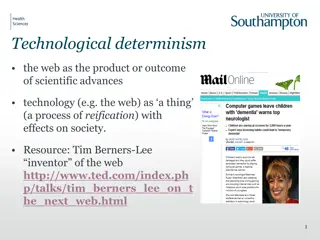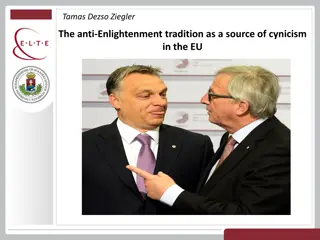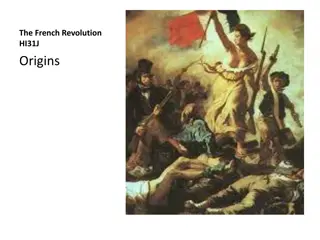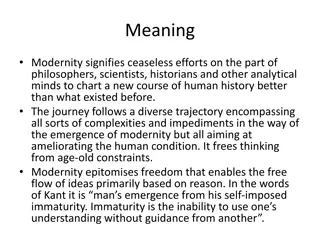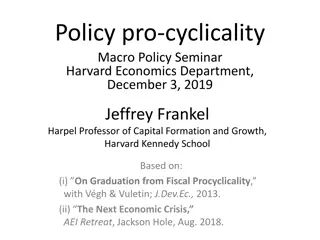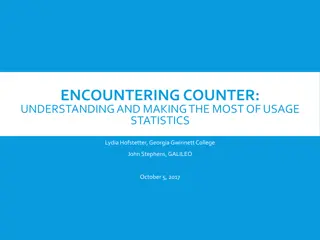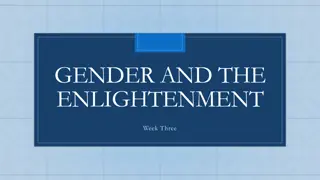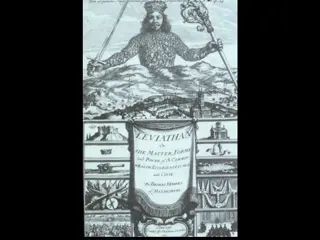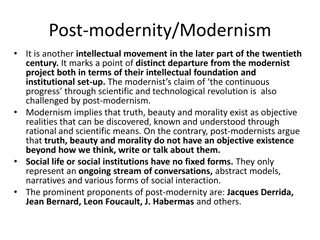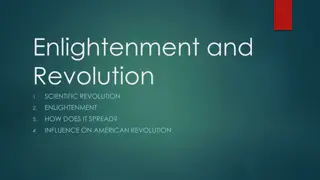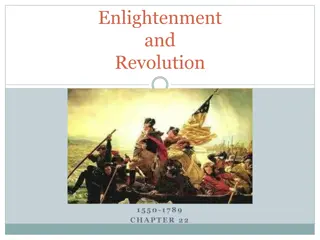Critical Analysis of Modernity and Counter-Enlightenment Perspectives
The idea of modernity is scrutinized for its complex relationship with theological concepts, revolution, and progress. In contrast, the counter-Enlightenment emphasizes the diversity of national cultures shaping human behavior and worldviews. Various readings explore modernity's impact on individuality, disenchantment, democracy, and social concerns like anomie and alienation.
- Modernity analysis
- Counter-Enlightenment critique
- National cultures
- Individuality in modernity
- Social impacts
Download Presentation

Please find below an Image/Link to download the presentation.
The content on the website is provided AS IS for your information and personal use only. It may not be sold, licensed, or shared on other websites without obtaining consent from the author. Download presentation by click this link. If you encounter any issues during the download, it is possible that the publisher has removed the file from their server.
E N D
Presentation Transcript
Critical Scrutiny of the Idea of Modernity The unstinted support enjoyed by the discourse of modernity seems to be the result of a euphoria generated by the explosion of new modern ideas and its success. However, contrary to this tall claim the realities reflected something very different. The formation of modernity simultaneously reflects both continuities and discontinuities with the past. Many historians have shown the continuity of theological ideas through the discourse of modernity in a refined form. Of course, these ideas were secularized. Nonetheless, the basic modern idioms of revolution and progress were also contained in the theological conceptions of new beginnings.
Counter Enlightenment Since the discourse of modernity is quintessentially the product of the project of Enlightenment, some critics have targeted modernity by developing counter Enlightenment ideas. Isaiah Berlin emerges as one of the leading critics of this genre. His main objection is that the idea of Enlightenment promotes a reductionist and monistic theory of human nature. According to this theory human behaviour is conceived as fundamentally uniform across time and space and therefore subject to common laws of explanation that hold true everywhere.
Counter Enlightenment (Contd.) The counter-Enlightenment, by contrast, postulates the significance of a variety of distinct national cultures that constitute an organic whole developing according to their own internal principles. Montesquieu referred to these principles as the general spirit of a nation . According to Montesquieu, the general spirit of a nation shapes the nation s distinctive laws, customs and institutions. These national cultures do not only determine the behaviour of its inhabitants but also shapes their understandings of the world. Therefore, they cannot be reduced to the same uniform laws of behaviour. The plurality of culture redefines human nature in the light of the role played by varied heterogeneous cultures in shaping not only our secondary attributes but also our heart, soul and mind inescapably converging with these social cultural practices.
Different Creative Readings of the Discourse of Modernity In view of the plurality of culture this idea has a great proximity to develop its own comprehensive counter narrative which is distinct from earlier historical processes. Steven B. Smith, in particular, foregrounds this significant feature of modernity. According to him, the idea that modernity is associated with the secularization of our institutions has given rise to fears about the rationalization and disenchantment of the world. The rise of a market economy and the commercial republic gave way in turn to an anti-bourgeois mentality that would find expression in politics, literature, art and philosophy. The idea of modernity as the locus of individuality and free subjectivity gave rise to concerns about homelessness, anomie and alienation. The achievements of democracy went together with fears about conformism, the loss of independence, and the rise of the lonely crowd; even the idea of progress itself gave rise to a counter-thesis about the role of decadence, degeneration, and decline.
The Dialectic of Enlightenment The conceptions mentioned above are not so much anti- modern as they are part of the structure of modernity itself. Modernity has become inseparable from the doubts we feel about it. In other words, it is difficult for modernity to escape what two German philosophers Max Horkheimer and Theodor Adorno call the dialectic of enlightenment. Scepticism is one of the philosophical traits of modernity and hence it is difficult for its postulates to get away from critical inquiry. The same critical spirit that once directed against the past would be turned against modernity itself creating its own forms of disaffection with the present. This dialectical process used against the classical and medieval tenets was also applied against the project of modernity itself.
The Dialectic----(contd.) The dialectical process can easily be traced from Locke s sense of uneasiness , Rousseau s amour- propre , Hegel unhappy consciousness , Marx s alienation and Weber s disenchantment . Romanticism is also one of the philosophical strands that has attacked the discourse of modernity for its evolving an impersonal world absolutely snapped from its social moorings. Rousseau mounted an attack not only against the discourse of modernity but also its offshoot, the civil society. He maintains that the very creation of civil society responsible for the divisive notion of the social ultimately led to unmitigated social inequalities.
Rousseaus Critique of Enlightenment Rousseau, indeed, holds virtues and values of Enlightenment responsible for such a historic deception with the innocent people, taking them away from their real self. Rousseau s ideas that developed against modernity ultimately became a precursor to the emergence of Marxist philosophy. These early signs of uneasiness were later articulated more systematically by diverse philosophical traditions. Thus, different philosophers and their diverse traditions have critically assessed, analyzed and interpreted the idea of modernity.
Critical Theory Critical theory, an intellectual offshoot of the Institute of Social Research, popularly known as the Frankfurt School has presented incisive interpretations of the processes of modernity that have led to unintended consequences such as wars, super-power rivalries and nuclear armaments in the 20thcentury and thereafter. The instrumentation of core philosophical postulates of modernity- reason and rationality-have been held responsible for destructive outcomes unleashed by them. It is important to mention specially the views of four representative philosophers of this school- Horkheimer, Adorno, Marcuse and Habermas.
Critical Theory (contd.) Initially the philosophers of this school were influenced by the traditional Marxism and its historical analysis at the level of material socio-economic factors, ignoring the ideological aspect of liberalism and terming it super- structural. However, later on the political theorists shifted their positions and focused more on ideological aspects of liberalism and capitalism, the off-shoots of modernity. For Horkheimer and Adorno the claims of modernity that it would free individuals from superstitions and hierarchies and would ultimately empower them to freely choose their of the good life have proved hollow. They have critically comprehended the processes of enlightenment and modernity in their famous book, Dialectic of Enlightenment.
Critical Theory (contd.) In this book they have made an attempt to trace the historical roots of enlightenment to understand how the intrinsic value of reason cropped up by the enlightenment, and then gradually slipped into instrumental value. It, as a result, not only diminished the value of reason but also constituted a society of the political unconscious. In reality, science and empiricism have produced a socially and politically unconscious being, unaware of whom s/he is serving or whom s/he is helping to exploit. Thus, the constant concern of instrumental reason undermined the philosophical assumption of modernity and also at the same time gave rise to the destructive consequences. According to Horkheimer and Adorno, the retrieval of such a situation is only possible through dialectical imagination in non- reductionist and historically situated imagination which the instrumental reason has imperiled.
